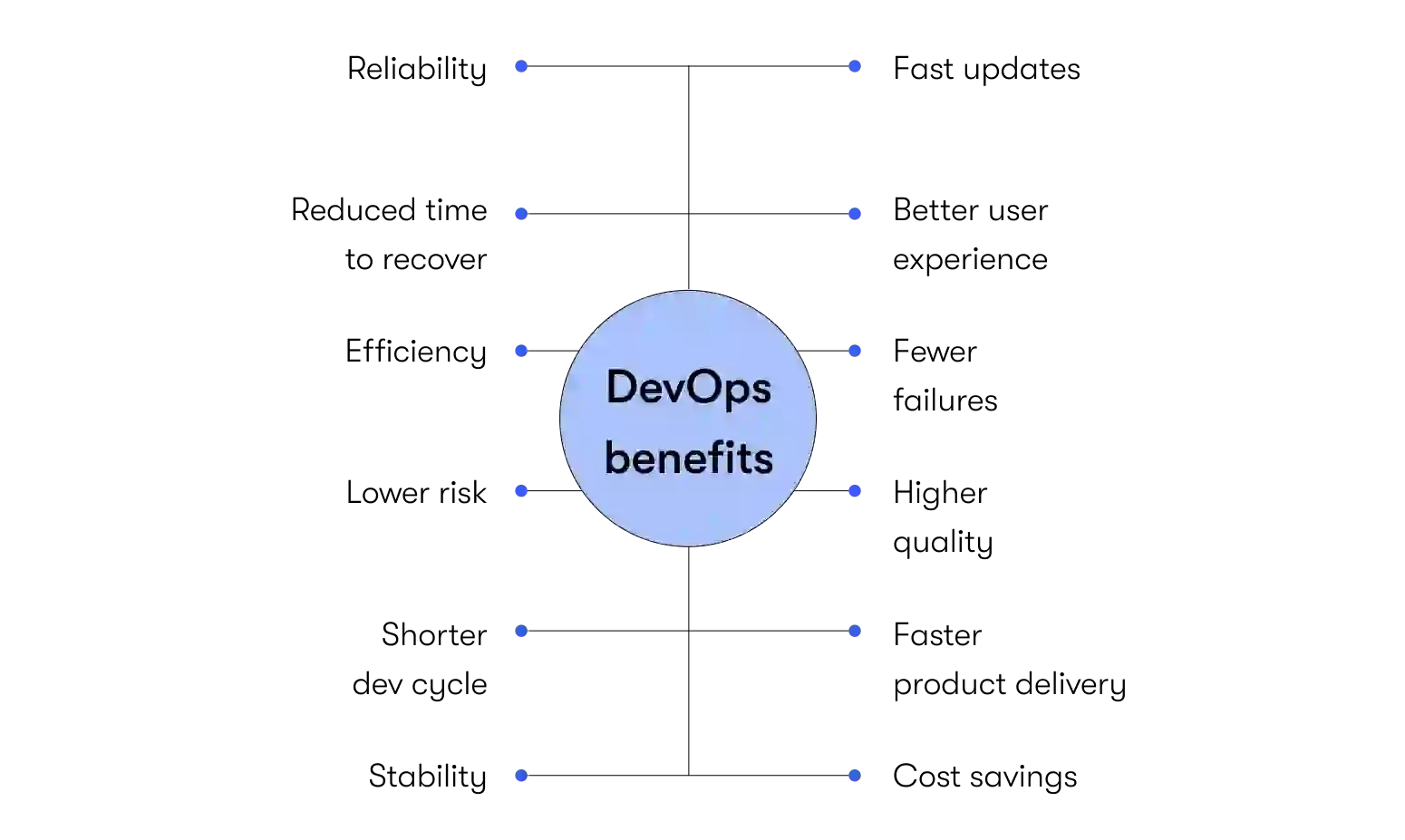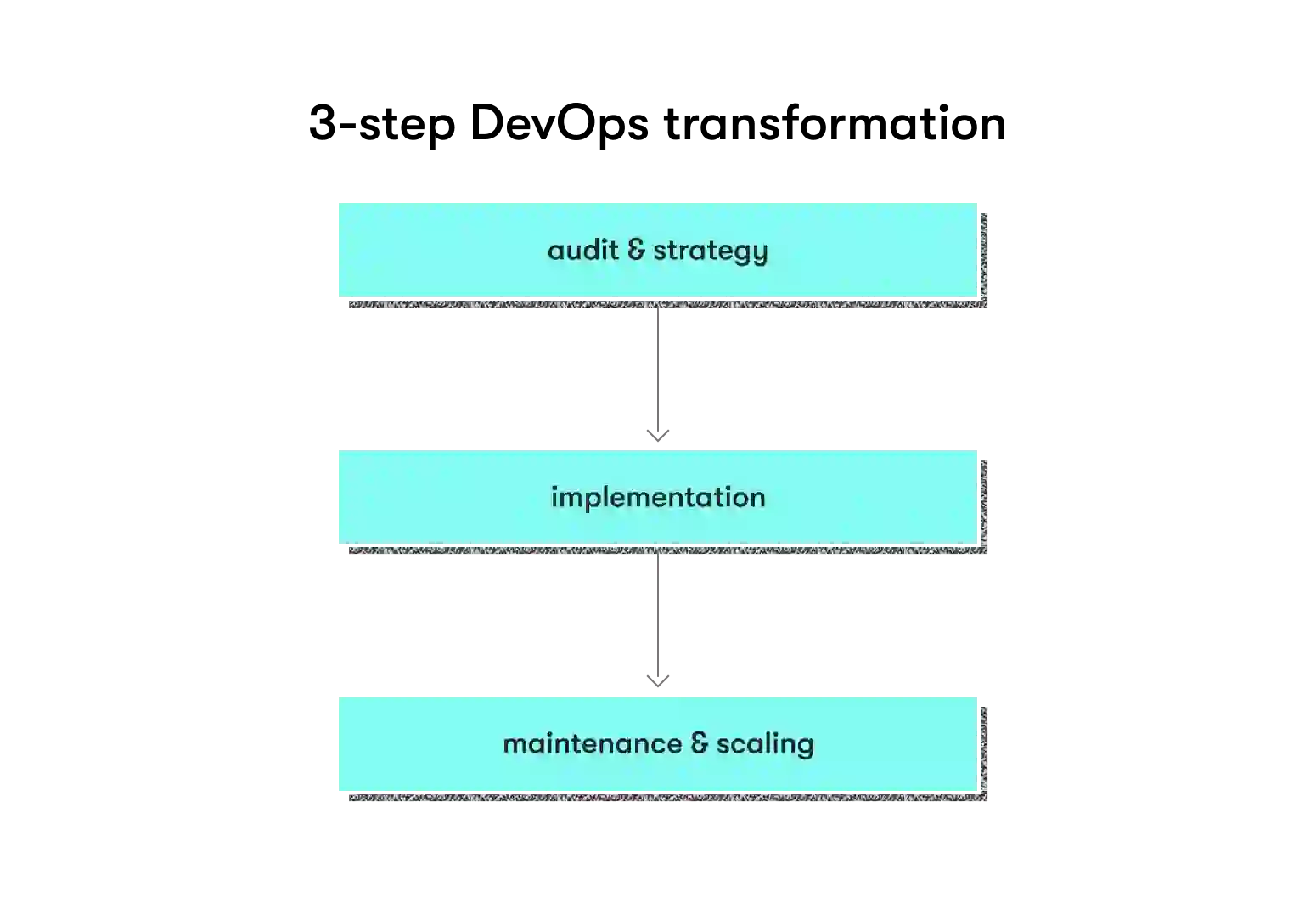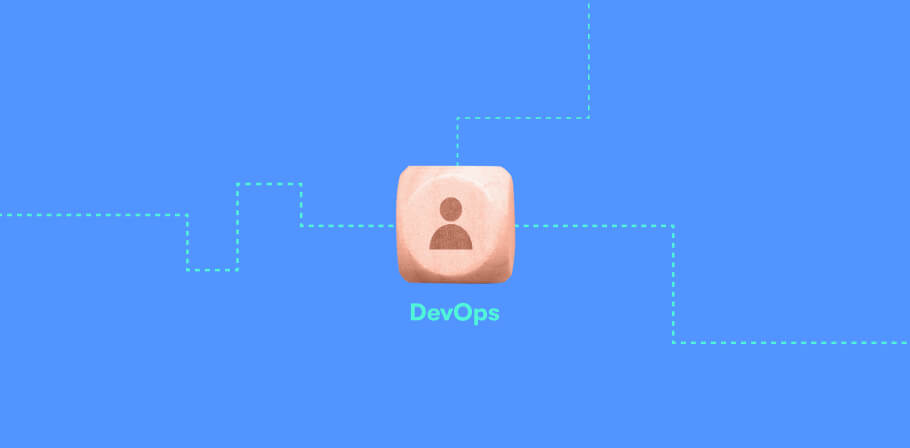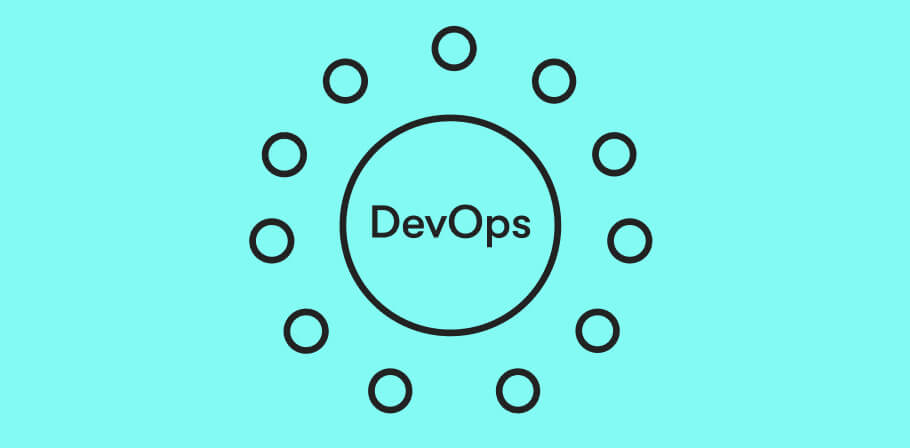DevOps presents a software development philosophy that captures the enhanced benefits of rapid deployments and pipeline reliability through the collaboration and integration of cross-functional team members, including developers (dev) and operations (ops). A work culture of shared responsibility leads to a better end product and a more efficient pipeline.
If your company suffers from slow deployment, manual execution, and fractured workers stuck in silos, DevOps practices can help transform your company structure. But the change into DevOps is not easy, as several barriers impede what could be a progressive shift in work culture.
Still, the benefits associated with DevOps far outweigh the risk of remaining stagnant with legacy tools or processes. Productivity increases, lower costs, and a better return on investment make DevOps an essential element for any organization that wants to remain competitive.
To help you through your DevOps adoption journey, we as a provider of DevOps services have outlined all the details you need to know to make a successful transformation, along with three simple integration steps.
6 signs your organization is ready for DevOps
When should you integrate DevOps into your company culture? You might find that your current business processes work fairly well. The adoption of DevOps seems to involve undue costs and resource usage, and a ground-up strategy change feels risky. But if your organization suffers from the following six “red flags,” you most likely could benefit from adopting DevOps:
- Deployments are minimal
- Deployments are manual
- Deployments are frequently delayed
- There's lack of communication within your cross-functional team
- No one knows the pipeline end goal
- Management offers no helpful feedback
DevOps adoption challenges to overcome
You might feel ready to transform your organization with DevOps to capture all the possible efficiencies of the DevOps methodology. It is a perfect time: as more businesses capitalize on the advantages the DevOps philosophy provides (e.g., greater collaboration, faster deployments, improved management practices), pressure can build to stay competitive, especially if you are stuck with legacy frameworks or tools.
But adopting DevOps has its own sets of obstacles to surpass. A series of organizational and cultural expectations in the IT industry can confuse and distort your attempt to incorporate DevOps into your business. Such barriers, if not handled with expertise, can result in a costly and less effective structural transformation. To maintain an efficient and seamless shift into the cultural mindset of DevOps, prepare to overcome the following adoption challenges:
Breaking down the siloed mentality
Many engineers cannot shake what they perceive as a fundamental divide between developers and other members of a cross-functional team. Under such a work environment, friction can develop at various stages of an active pipeline.
In reality, integrating the various roles within multi-role teams is a technical issue and an exercise in coordination because everyone can share the project and product responsibilities (and its successes).
Resistance to change
On a more general level, various stakeholders within the company may also resist any new changes. Alterations to the status quo can feel like a risk, and aggressive modifications can scare people, especially if they do not understand all the benefits DevOps provides.
Your DevOps transformation roadmap planning should occur as a progressive and smooth process. If done right, a gradual shift allows everyone to acclimate to the new management processes and development cycle.
Selecting the right tools
Many companies try to implement DevOps but forget about continuous testing principles and automation. Others select competing tools that set up different teams to clash or fall to integrate seamlessly. In many cases, the organization forgets all about the engineers themselves and hastily inserts unknown DevOps tools and practices, to much confusion. You may resist such changes significantly, especially if there is no integration strategy or open communication.
Accepting a new organizational culture
A core principle of the DevOps philosophy is accepting failure and the belief in experimentation. The faster you fail, the faster you can take steps to correct any bugs or issues. Problem-solving speed increases within a culture of rapid feedback and failure.
You may find teams struggle to adapt to such a mindset shift. Taking ownership of failures is not easy, especially for siloed individuals. Getting comfortable with an integrated life cycle and continuous learning can take time and effort.
GET A SOLUTION TO THESE CHALLENGES
Learn how to overcome DevOps adoption barriers and start your transformation right
DevOps transformation payoffs to expect
While the initial challenges regarding agile DevOps transformation may take effort to surpass, the DevOps methodology offers a series of benefits that, in the long run, lead to a superior pipeline and organization structure.
Better product quality
The continuous integration and delivery held by the DevOps model optimizes the end product. For example, integrated testing allows for a more scalable and robust product. But more importantly, a focus on collaboration and communication creates the necessary environment for innovation to evolve. Expect a boost in customer satisfaction and product quality as you shift to fast and reliable releases.
Lowered costs
DevOps will cut down management and production costs throughout each department. Maintenance decreases as new updates change static roles into dynamic and productive teams. What is not efficient is updated or removed according to DevOps principles. System stability allows for better scaling with less risk, and stable environments built with transparency empower employees to work around a unified strategy.
Productivity increase
DevOps best practices contribute to overall productivity. Automation frees workers to focus on projects that require human intervention without hampering deployment speed. Faster release cycles allow for easier change management and oversight. Problem-solving and feedback give developers the tools they need to succeed. Expect a boost in pipeline output as collaboration builds between teams.
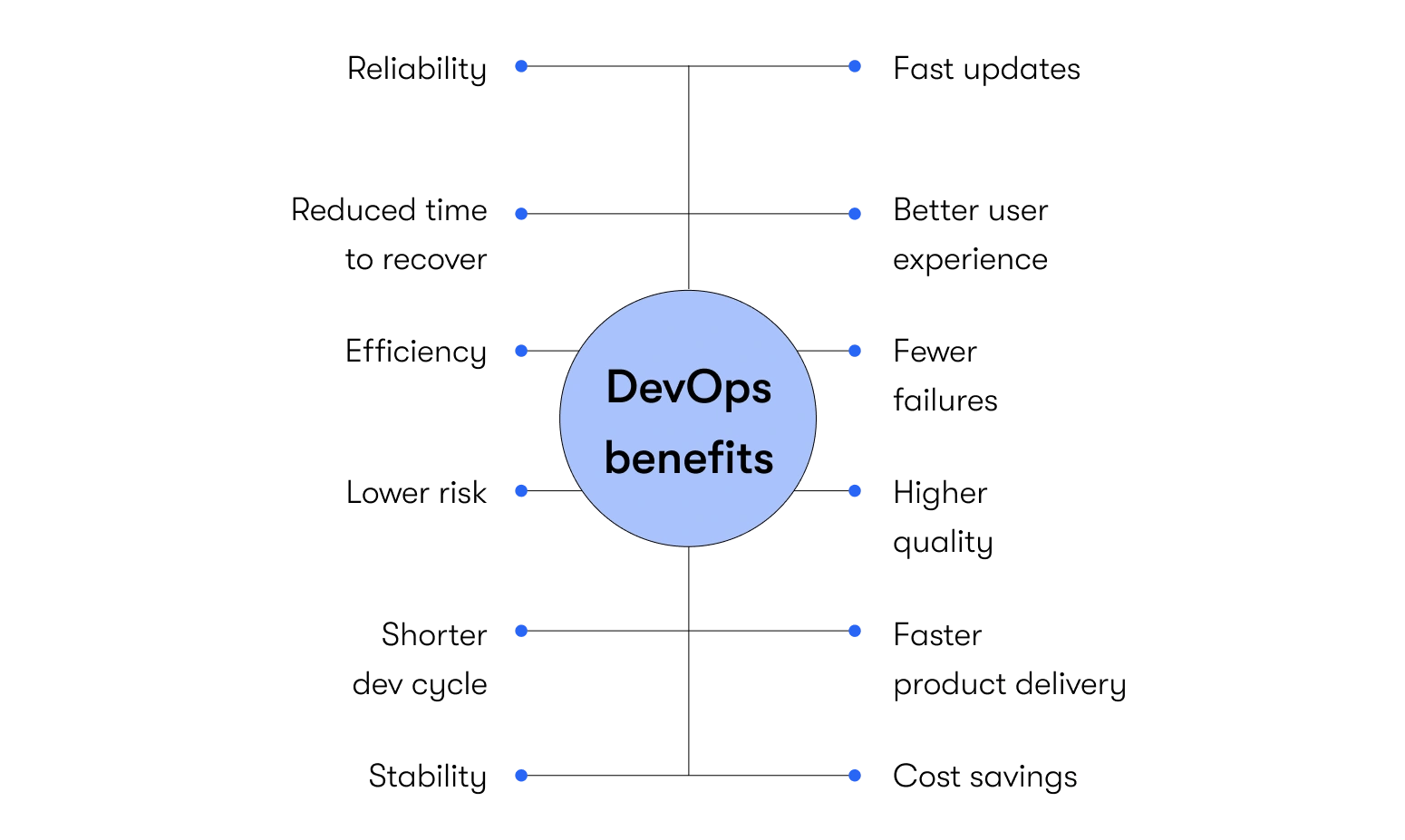
3-step agile DevOps transformation roadmap
While the shift to DevOps is a complex, long-term process, there is an overarching three-step plan we at EPAM Startups & SMBs have developed to expedite our clients’ DevOps transformation roadmap development and execution.
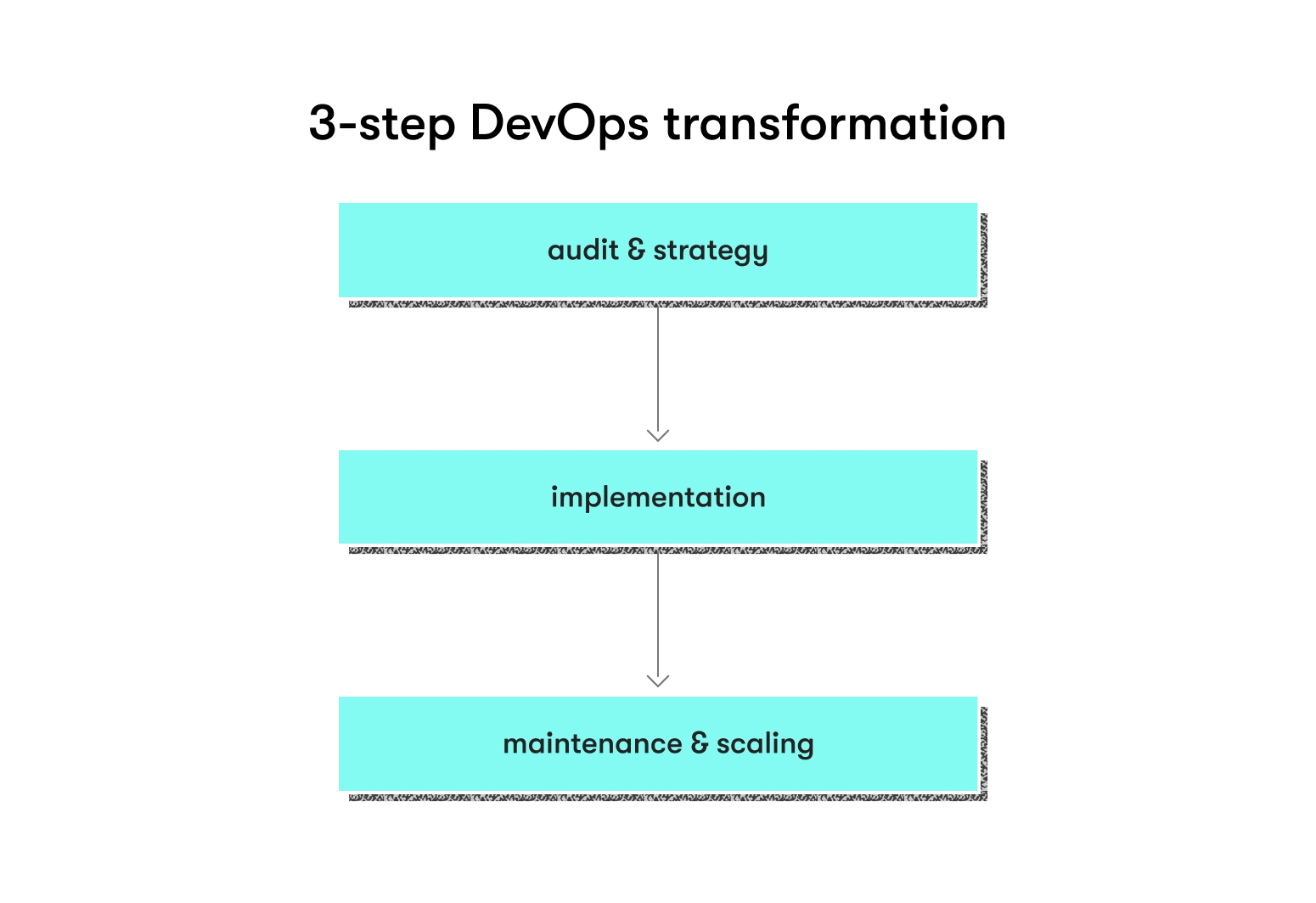
Step 1: audit & strategy
An effective management culture shift needs a map with information about where you are and where you would like to go regarding DevOps adoption. An in-depth analysis can tell you the state of your company and its needs, while a high-level strategy can depict a direction for your transformation journey.
The data from the evaluation or audit will also influence DevOps adoption. For example, a detailed list of which processes you currently automate will help determine which tool sets are needed. Manual delivery can shed light on poor agile function and ingrained silos. Uncontrolled governance with limited communication speaks to fragmented awareness and low motivation for current team members. Having clear business objectives drive change will result in an optimized process.
How we help:
- Our DevOps experts engage in a full-scale audit to map the current state of your software delivery processes and team collaboration dynamics.
- We identify organizational needs as the first step to building a unique, reliable, and company-specific DevOps change plan.
- We evaluate risks, challenges, and opportunities associated with your agile DevOps transformation journey.
- We develop an iterative DevOps transformation roadmap, outlining the effort and resources needed and enabling ultimate traceability and manageability of your transformational process.
Step 2: implementation
With a defined roadmap, you can engage in implementation. But since the transformation into DevOps is a gradual process, it will include several stages of execution. Each of the implementation stages will incorporate DevOps into the current organizational structure.
To make the transformation safer and smoother for everyone involved, we set up transformation loops based on industry best practices and our own Engineering Excellence (EngX) framework. This approach propagates self-awareness of the management as well as self-awareness of the engineering team, aimed at maintaining product and team health while introducing the culture of continuous and measurable improvement. This creates an environment of risk-free improvements with visibility into how they actually impact the company’s productivity.
As part of the QA transformation that’s integral at this stage, you will need to engage in project intakes, pipeline testing, tool selection, and QA alignment. A shift into automation throughout your software development life cycle is a necessity. You will need to set up new key performance indicators (KPIs) that track output and determine where improvements can occur.
How we help:
- We set up and integrate your dedicated DevOps team of the required composition and expertise, scaling the resources as needed.
- We supervise the team onboarding and coordinate the successful implementation of each DevOps transformation roadmap phase.
- We report on the progress and the team’s KPIs throughout the project.
A case in point: EPAM delivers DevOps automation for Bacardi’s digital marketing platform
With an automation platform implemented by EPAM, the client achieved 16 times better website deployment capacity across its digital portfolio and reduced hosting infrastructure costs by 42%.
Step 3: maintenance and scaling
As the DevOps implementation occurs, the third step involves efforts to achieve the reliability and growth of the new processes at scale. Constant feedback will outline not only the areas that bring benefits but also the areas across your pipeline that need further improvements.
For example, many operations processes will update into collaborative workflows. New methods that assign work within a culture of teamwork can influence how members interact. Different evaluation metrics and KPIs can change behavior that contributes to easier process scaling.
Monitoring will also increase as velocity builds. The more resources used, the harder it can be to track utilization. Some aspects of the pipeline will need new configurations, while others will require additional creative problem-solving to maintain deployment speed.
How we help:
- We supply the DevOps team as needed to support your growth and provide sustainable DevOps maintenance.
- We maintain the culture of continuous improvement and take DevOps to all corners of your organization to unlock more efficiencies.
Why go DevOps with EPAM Startups & SMBs
The complexity of a DevOps transition requires nuanced knowledge that only experts can provide. Our DevOps as a service will give you the advantages of DevOps without the common startup headaches.
With EPAM Startups & SMBs as your DevOps partner you can:
- Access top DevOps expertise: We have the best in-house DevOps engineers from around the world to facilitate your DevOps adoption.
- Reduce team administration burden: Remote teams remove the costs associated with in-house team onboarding, while we cover all team administration responsibilities as part of our offering.
- Lower expense: A specialized team well-versed in DevOps can bring in change faster and with less cost than internal hires or management replacements.
START YOUR DEVOPS TRANSFORMATION
with EPAM Startups & SMBs
Summing up
DevOps has altered how organizations approach software development. As its principles of collaboration and integration increase deployment speeds, your organization needs to adopt DevOps to remain competitive.
Your transformation journey will be characterized by the following key takeaways:
- DevOps will radically improve the speed of your pipelines and product quality
- DevOps will transform your current operations practices and management structure for improved ROI
- The DevOps adoption process will involve a series of challenges and barriers you need to prepare for
- An expert DevOps partner can facilitate the process and ensure a smooth and progressive transformation with more efficiency
DON’T DELAY YOUR DEVOPS TRANSFORMATION
Contact EPAM Startups & SMBs to discuss DevOps talent sourcing and our DevOps transformation services

Expert digital communicator and editor providing insights and research-based guides for technology buyers globally.
Expert digital communicator and editor providing insights and research-based guides for technology buyers globally.
Explore our Editorial Policy to learn more about our standards for content creation.
read more

